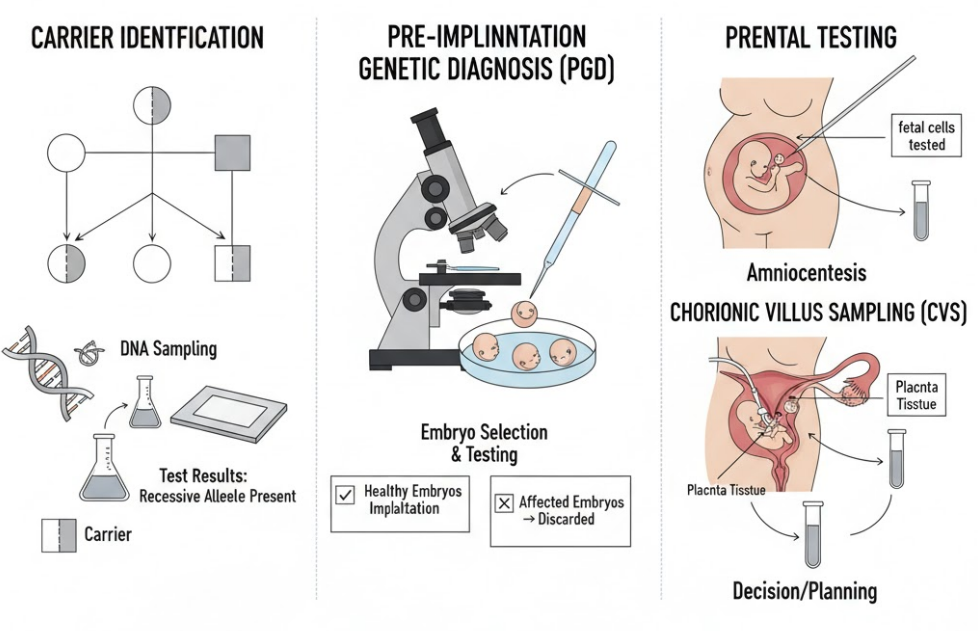Edexcel A Level (IAL) Biology -2.17-2.18 Genetic Screening- Study Notes- New Syllabus
Edexcel A Level (IAL) Biology -2.17-2.18 Genetic Screening- Study Notes- New syllabus
Edexcel A Level (IAL) Biology -2.17-2.18 Genetic Screening- Study Notes -Edexcel A level Biology – per latest Syllabus.
Key Concepts:
- 2.17 (i) understand the uses of genetic screening, including the identification of carriers, pre-implantation genetic diagnosis (PGD) and prenatal testing, including amniocentesis and chorionic villus sampling
(ii) understand the implications of prenatal genetic screening - 2.18 be able to identify and discuss the ethical and social issues relating to genetic screening from a range of ethical viewpoints, including religious, moral and social implications
Genetic Screening & Prenatal Testing
🌱 Introduction
Genetic screening is the process of examining DNA to identify mutations or alleles that may cause genetic disorders.
It helps in early detection, prevention, and informed decision-making for families.
(i) Uses of Genetic Screening
1. Identification of Carriers
- Some people carry recessive alleles for genetic disorders but do not show symptoms.
- Screening identifies these carriers, helping couples assess risk of passing disorders to offspring.
- Example: Carrier of cystic fibrosis or sickle cell anemia.
2. Pre-implantation Genetic Diagnosis (PGD)
- Performed before implantation during IVF (in vitro fertilization).
- Embryos are tested for genetic disorders.
- Only healthy embryos are selected for implantation → prevents genetic diseases in offspring.
3. Prenatal Testing
Done during pregnancy to check if the fetus has genetic abnormalities.
| Method | How it works | Timing | Notes |
|---|---|---|---|
| Amniocentesis | Sample of amniotic fluid (contains fetal cells) | 15-20 weeks | Cells tested for genetic disorders |
| Chorionic Villus Sampling (CVS) | Sample of placental tissue | 10-12 weeks | Can detect same disorders earlier than amniocentesis |
(ii) Implications of Prenatal Genetic Screening
1. Medical & Family Planning Benefits
- Allows early diagnosis of genetic disorders.
- Helps families prepare medically, financially, and emotionally.
- Can guide treatment or lifestyle planning during pregnancy.
2. Ethical & Social Considerations
- Decisions about continuing or terminating pregnancy may arise.
- Risk of discrimination or stigma against individuals with genetic disorders.
- Raises questions about designer babies and selective breeding.
3. Psychological Implications
- Can cause anxiety or stress for parents awaiting results.
- Counselling is recommended before and after screening to support informed choices.
💡 Key Points
- Genetic screening = early detection of disorders.
- PGD → prevents genetic disorders before pregnancy.
- Amniocentesis & CVS → detect disorders during pregnancy.
- Screening helps in planning, prevention, and informed decision-making.
- Raises ethical, social, and psychological considerations.
🧠 Quick Recap
| Term | Explanation |
|---|---|
| Carrier | Person with recessive allele but no symptoms |
| PGD | Genetic testing of embryos before implantation |
| Amniocentesis | Sampling amniotic fluid for fetal cells (15–20 weeks) |
| CVS | Sampling chorionic villus (placental tissue) 10–12 weeks |
| Implications | Early detection, family planning, ethical & social considerations |
Ethical & Social Issues in Genetic Screening
🌱 Introduction
Genetic screening can identify carriers, diagnose disorders early, and prevent disease, but it also raises ethical, moral, and social questions.
It’s important to consider different viewpoints before deciding on testing or action.
🔹 Ethical Issues
| Issue | Explanation | Example / Consideration |
|---|---|---|
| Informed Consent | Patients must fully understand risks, benefits, and limitations of screening before agreeing. | Couples should know implications before PGD or prenatal testing. |
| Autonomy | Individuals should make their own decisions without pressure. | Parents choosing whether to continue a pregnancy after prenatal diagnosis. |
| Confidentiality | Genetic information must be kept private to prevent discrimination. | Insurance or employers should not access results without consent. |
| Non-Maleficence | Avoid causing harm through testing or disclosure. | Stress or anxiety from knowing carrier status. |
| Beneficence | Testing should benefit the patient/family. | Early diagnosis allows treatment or planning. |
🔹 Social Issues
| Issue | Explanation | Example / Consideration |
|---|---|---|
| Discrimination | People may face social or workplace bias due to genetic results. | Carrier of a disorder may be denied insurance. |
| Stigma | Certain genetic conditions may carry social stigma. | Families may hide a child’s disorder. |
| Access & Inequality | Not all individuals have equal access to screening or treatment. | PGD or IVF may be expensive and unavailable in low-income areas. |
| Designer Babies & Eugenics | Screening may lead to selection for preferred traits, raising moral concerns. | Choosing embryos based on eye color, height, or intelligence. |
🔹 Religious & Moral Viewpoints
- Religious perspectives can strongly influence decisions:
- Some religions oppose abortion, even for detected disorders.
- Others encourage prevention of suffering through testing.
- Moral considerations involve:
- Balancing the rights of the unborn child vs rights of parents.
- Questioning whether it is ethical to select against certain traits.
🔹 Summary of Considerations
- Genetic screening offers medical benefits but also involves ethical dilemmas.
- Decisions must balance:
- Medical benefit (reducing disease burden)
- Autonomy and consent
- Religious & moral beliefs
- Social equality & fairness
🧠 Quick Recap
| Aspect | Key Points |
|---|---|
| Ethical | Consent, autonomy, confidentiality, harm/benefit |
| Social | Discrimination, stigma, access inequality, designer babies |
| Religious / Moral | Beliefs may influence acceptance, balance rights of parents & child |
| Overall | Screening has benefits, but decisions must consider ethical, moral, and social impact |
